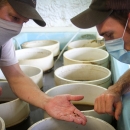Freshwater mussels, benthic and filter feeding, maintain or improve water quality conditions and support diverse aquatic communities that are beneficial for salmon, lamprey and other native fish. The mussels also have cultural importance for the tribes of the Pacific Northwest in that they are first foods that are culturally significant for adornment and trade. The freshwater mussels are some of the most imperiled species in North America. The Western Pearlshell mussel (Margaritifera falcate), the current species of focus at Abernathy, is listed as "near threatened" on the International Union for Conservation of Nature (IUCN) Red List. Habitat loss and warming water may be partially to blame for its decrease in numbers. Little is known about the life history traits of the Western Pearlshell, however, as a mussel unable to move quickly from inhospitable surroundings, it will likely be slow to adapt to environmental changes such as water temperature and increased sedimentation. Water temperature, specifically warming water, could have a negative impact on the mussels' survival. Understanding the effects of water temperature on mussel behavior and physiology will be important to inform sampling methods and possibly relocation protocols. Holding mussels in a laboratory setting for studies will require research in the area of nutritional needs including particle size of the feed. Also needed will be the development of feeding protocols. Knowledge gaps for western mussels include feed for use in a captive environment, optimal water temperatures, and flow conditions.
Research


